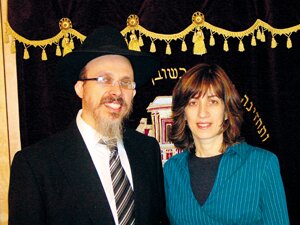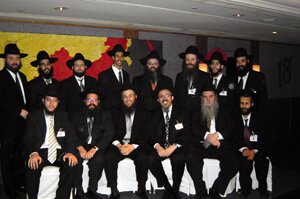Warning: Parameter 1 to plgContentLoginToRead::onAfterDisplayTitle() expected to be a reference, value given in /home/joomla789/domains/jewishtimesasia.org/public_html/libraries/joomla/event/event.php on line 67
| L.I.F.E as we know it throughout Asia |

|

|
|
L.I.F.E. (Lubavitch in the Far East) was given birth to in 1986 when simultaneously Chabad Hong Kong first officially opened its doors. The story of one family is the story of the L.I.F.E family. Proud parents, Rabbi Mordechai and Goldie Avtzon, watch almost in disbelief at how their children have grown, how their family has flourished
Hong Kong was Chabad's first step into Asia. In 1985 the community had reached out to Chabad directly in a letter addressed to the Rebbe himself. The Rebbe personally opened all his mail and that very week Rabbi Kotlarsky, a representative from Chabad headquarters, was sent out to assess the need. A few weeks later Rabbi Avtzon was asked to set out on what would become the journey of a lifetime. Along with another student rabbi he began to survey the landscape and assess the needs of the community. Months turned into a year for Rabbi Avtzon when he was appointed as the Rabbi of Ohel Leah for one year.
In March of 1986 Rabbi Avtzon married Goldie. Goldie was truly married into the Hong Kong adventure. In fact, Goldie’s late uncle, a businessman with many contacts throughout Asia, was known as the “Ambassador of the Orient†within the Lubavitch community. It was besheret from the start. After completing his contract with the Ohel Leah, Rabbi Avtzon and Goldie were both personally appointed by the Rebbe to lay the foundations on this new frontier for Chabad. The early days in Asia were tough for Chabad and the young couple. Even phone calls home were difficult and expensive. There also was no formal education in place for Jewish children.  To answer their need, Chabad helped to found the Carmel School which is now the Hong Kong community’s pride.  However, as their children grow older, the issue of their education continues to be a challenge. While the Avtzons had faith in the Rebbe’s vision, skeptics and critics pitied the Avtzons for “buying into something that was not grounded in reality, a mere pipedream.†In fact, a member of the Jewish community in Hong Kong promised to contribute to this Asia project after three months, certain they would not last that long. Twenty years later, the L.I.F.E. community stretches across Asia and continues to experience growth they never dreamed of. Unlike other professions, Rabbi Avtzon and his fellow schluchim work together with their wives and families, the identity and responsibility is assumed by all of them. The children of schluchim “travel the world with the same “business cards†as their parents.â€
The Avtzons fondly recall one episode that perfectly exemplified this identity. When their eldest child, then age eight, was told that he was to be educated partly in Australia he understood that the family would be leaving Hong Kong. (The plan was actually to go for a couple of months) Their young son exclaimed, “You can’t give up. Jewish history was not built by people who give up.†Chana, the Avtzon’s second daughter, is in the process of establishing a mini regional conference targeting daughters of shcluchim ages 8-11 for a regional girl’s Shabbat.  Fostering this sense of pride and ownership extends far beyond the children of the schluchim. Chabad is unique from other organisations in that there is no such concept as membership. The Rebbe taught that all Jews are automatically members by birth, or by conversion a form of birth. They are individual self supporting organisations that are in partnership with participants. A scheme was created in Hong Kong, and modeled throughout Asia, called Partners. Proposed members of the community take on a stipulated share or shares of the total budget of Chabad, fostering a true a sense of ownership, responsibility and pride. Jewish pride in this sense sees monetary contributions not as an obligation but a mutually beneficial arrangement. Schluchim must generate their own funding. At times, a budget for a predetermined number of years is made available but the Shluchim are then expected to generate enough activity and support for their center to operate. This arrangement can be challenging for individual schluchim but carries with it its own rewards. Schluchim don’t enter into a contract. They have a sense of ownership over their positions and think long-term about their postings. So much so that although the Avtzon’s had some difficult days early on in Asia, they hope that Hong Kong will be the place, the home, that their children will one day return to. The challenges in new centers that present themselves around the Far East include things many Jews take for granted, including the availability of kosher food and wine. Everything must be brought into new centers. Currently in Vietnam the shliach himself must take his dishes to the river to be ritually immersed. There is no mikveh, there is no staff available to aid in these essential tasks. As Goldie explains, “life for a Shlucha in Asia is truly all encompassing and all consuming.†They must all continuously balance each other’s needs, their children’s needs and the community’s. They worry about raising their children in isolated places, cut off from the main arteries of Jewish life, but that is often the role of the shluchim.  Both husband and wife attend a regional conference annually, with conferences simultaneously coordinated for their children. The organised networking of Chabad regionally and globally is truly remarkable. The Shluchim office, in New York, on organisation responsible for serving the needs of the Shluchim worldwide, is another way in which the Shluchim band together. Amongst many services, this office offers Shluchim internet networks for idea exchanges, conference calls on popular activities, and assistance with staff recruitment Children are a major part of this networking scheme. There are camps, conference calls and online schooling arrangements for the kids. Post Yeshiva boys and girls, raised with in the system are required to go abroad as part of their education. While some choose settings that offer formal education, others choose to be pioneers and journey to the Far East to aid the community with their programming. Hong Kong alone has six young men, their Men in Black, aiding their efforts in this continuously growing community. Other cities throughout Asia likewise rely on the assistance from these committed and energetic young ambassadors. Thailand, depending of the seasonal needs, draws assistance from as many as ten young people. Thailand is the perhaps the perfect example of this networks ability to grow itself and the innovation and vision required to develop a new community. Thirteen years ago schluhim went in to serve the local Bangkok community but discovered the backpacker phenomena with unfulfilled needs. Thailand blossomed and grew into an incredible network that has greatly expanded its initial direction. Overall, L.I.F.E’s innovative and inspiring programming is able to draw in Jews that have journeyed from the four corners of the globe and continue to journey. Many of the major developments in Jewish life in Asia have sprung up as a direct result of Chabad’s continued efforts to develop and improve the spirit of “brotherly love†amongst Jews in even the most remote corners of the earth. Rabbi Avtzon gives thanks to the Rebbe “who was blessed with such great vision to be able to look beyond the current reality†towards a dream for the future. Inspired by the Rebbe’s vision, he sees potential for continued future growth, over the next few years, in China at the rate of two cities per year, and also new opportunity in Macau. As Rabbi Avtzon promises, “if you build it they will come.â€Â L.I.F.E. is assessing remote communities in the region to determine where additional schluchim are needed. The Avtzon’s once traveled to such a place. Their “family†has truly grown. Over twenty years later they have given birth to and raised seven children, some of which have already gone off around the world to continue their education. Over twenty years later L.I.F.E has given birth to eighteen Chabad centers in seven countries in Asia, each finding its own path but remaining a proud member of the family.  Fact Box Chabad of Hong Kong  (Issue November 2006)Â
|














 Â
 

